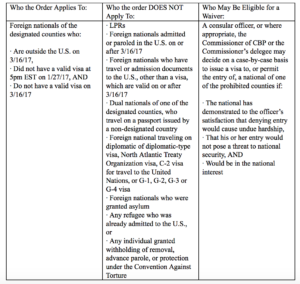AILA Summary and Analysis of Executive Order
On Friday, January 27, 2017, President Trump signed an executive order, “Protecting the Nation from Foreign Terrorist Entry into the United States.” The Order led to chaos in many of our nation’s airports and was the subject of multiple lawsuits filed around the country. On February 3, a federal district court in the state of Washington issued a nationwide temporary restraining order, prohibiting the federal government from enforcing several major sections of the Order. That decision was upheld on February 9 by the Ninth Circuit Court of Appeals, and the implementation of the Order has been suspended since that time. On March 6, 2017, the President signed a new executive order with the same title, “Protecting the Nation from Foreign Terrorist Entry into the United States.” The new Order takes effect on March 16, 2017, and expressly revokes the January 27, 2017 Order. The new Order prohibits entry into the U.S. by immigrants and visitors from six predominantly Muslim countries without requiring any individualized determination based on specific intelligence that the individuals are a security risk. The Order exempts certain categories of people, including lawful permanent residents and dual nationals traveling on a passport from a country that is not one of the six designated countries. AILA does not believe the new Order will withstand judicial scrutiny since the targeted countries are majority Muslim, and the Order fails to provide evidence that nationals of the six countries pose a threat to national security. Courts reviewing the first order also gave serious consideration to the discriminatory statements directed at Muslims made by the President and his surrogates. In addition, the new Order suspends refugee resettlement to the United States for 120 days and drastically reduces the number of refugees that the US Refugee Assistance Program (USRAP) will resettle in the fiscal year 2017 from 110,000 to 50,000. Syrian refugees are no longer indefinitely banned under the new order, though they are subject to the 120-day suspension of the refugee program. The new Order no longer gives preference to individuals facing religious persecution who practice minority religions in their country of nationality. Despite the minor changes made in the new Order, it will have devastating consequences for the USRAP. The new Order will not make us safer as a nation, and thousands of refugees who have been screened for resettlement will be trapped in dangerous conditions. Ban on Entry of Nationals of Muslim-Majority Countries: The order bans immigrant and nonimmigrant entries for nationals of Syria, Iran, Libya, Somalia, Sudan, and Yemen for at least 90 days. Some categorical exceptions and case-by-case waivers could be applied to nationals of these 6 countries. Iraq, which was included in the first order, is not included in the new Order, although Iraqi nationals will be subjected to additional scrutiny. Before individuals of the six countries can resume entering the U.S., an assessment of each country must be conducted by the DHS Secretary, Secretary of State, and Director of National Intelligence, to determine if additional information is needed in order to adjudicate a visa or other immigration benefit. The Secretary of State will then request the additional information from each country. If the country does not provide the additional information, or the DHS Secretary certifies that the country has a plan to provide that information, they will be included in a Presidential proclamation prohibiting entry of certain categories of foreign nationals. The Secretary of State, Attorney General or DHS Secretary can at any time recommend that additional countries be added to the list or taken off of the list.  The new Order confirms that no visa issued before March 16, 2017 will be revoked as a result of the Order, and that any individual with a revoked or canceled visa as only of the prior, January 27, 2017 Order is entitled to a travel document for travel and entry to the U.S.
The new Order confirms that no visa issued before March 16, 2017 will be revoked as a result of the Order, and that any individual with a revoked or canceled visa as only of the prior, January 27, 2017 Order is entitled to a travel document for travel and entry to the U.S.
